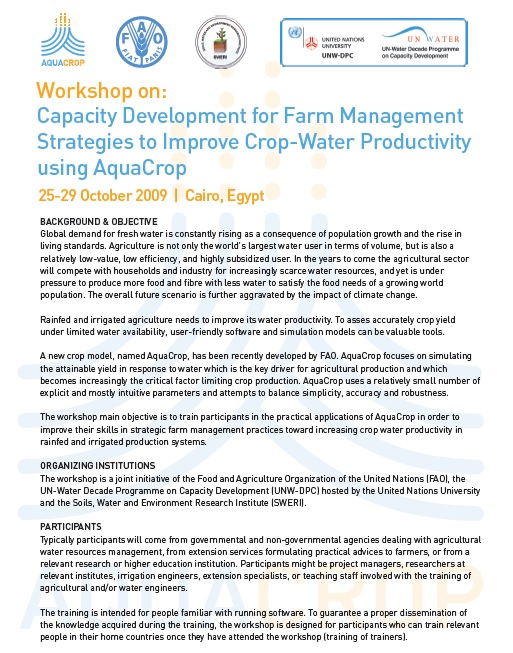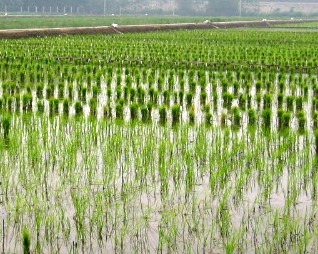ICRISAT–CEG to hold sixth training course

ICRISAT's Center of Excellence in Genomics (CEG), supported by the Government of India’s Department of Biotechnology, will host its sixth training course entitled 'Application of genomics technologies in plant breeding, from 16–27 November 2009 at the ICRISAT campus at Patancheru, Greater Hyderabad, India. The course will provide participants a hands-on opportunity to gain expertise in the use of molecular markers (SSRs, SNPs and DArTs), gene/QTL mapping and marker-assisted breeding. The course will focus on the experimental design and data analysis components of molecular markers, rather than the actual marker data generation technology. The course will also introduce concepts and prospects of modern genomics tools such as Next Generation Sequencing technologies, as well as bioinformatics tools and databases in plant breeding. Special attention will be given to the requirements for utilising a high-throughput marker service facility such as the one established at CEG. Since its inception in 2007, CEG has trained more than 100 scientists from India and other developing countries in the application of genomics technologies in crop improvement.
Eligibility
- The sixth training course is primarily open to Indian scientists, although there will also be a limited number of places for scientists from other developing countries who have a demonstrable ability to use both the techniques taught and the CEG marker services.
Expenses
- Selected Indian participants will be provided 2nd class AC train fare by the shortest route to/from ICRISAT plus boarding and lodging at ICRISAT.
- Candidates selected from other developing countries should source sponsorship from either their home institute or from external funding bodies to support travel expenses; ICRISAT–CEG will cover board and lodging at ICRISAT.
Deadline for submissions: Applications to be submitted online by no later than 15th September 2009
Contact for more information: This email address is being protected from spambots. You need JavaScript enabled to view it. , Leader, Centre of Excellence in Genomics and Principal Scientist (Applied Genomics), ICRISAT/ Subprogramme Leader, Generation Challenge Programme
More resources from SP5: MAB workshop, July 2009

From 29th June to 3rd July 2009, 26 participants from around the globe came together for an essentially practical, hands-on course on Marker-Assisted Breeding. The course, supported by GCP’s Subprogramme 5 and led by instructors Joost van Heerwaarden (University of California–Riverside), Hans Jansen and Marcos Malosetti (Wageningen University and Research Centre), with coordination from GCP’s SP5 Leader Carmen de Vicente, primarily targeted collaborators of GCP’s Tropical Legumes project. Course content comprised a healthy balance of theoretical sessions (derived from lectures and presentations) and practical tasks (based on example data together with the option for participants to work with their own data sets). Some of the key topics covered during the course included genetic linkage maps, phenotypic data analysis, QTL and QTLxE mapping, genetic diversity analysis and LD mapping.
To view presentations and other materials from the workshop, please visit our Capacity-building Corner.
GCP rice project in the news
- Published Date
GCP collaborators working on a rice project in The Philippines start to see the results of their hard work come to fruition as the outcomes of their research feature in journal articles and press releases.
Results from the GCP SP2 Commissioned project G4005.35 ‘Sequencing multiple and diverse rice varieties: connecting whole-genome variation with phenotype’, led by Ken McNally of IRRI, have been published online in the Proceedings of the National Academy of Sciences (PNAS), news which was also featured in two press releases.
To view these press releases, as well as media attention given to other GCP projects, please visit our Public Awareness page.
GCP holds data analysis workshop, 21–23 July 2009
- Published Date

A workshop on next generation sequencing (NGS) technology data analysis was held at ICRISAT Headquarters in India from 21–23 July 2009. The workshop, part of SP4 Commissioned project G4009.04: ‘Data analysis support for existing projects in SP2 with emphasis on analysis of Next Generation Sequencing data’, led by Rajeev Varshney (ICRISAT/GCP), was attended by approximately by 30 collaborators.
The aim of the workshop, primarily designed for bioinformaticians and programmers, and coordinated by Rajeev Varshney and B Manjula (ICRISAT), was to plan and develop strategies and tools for analysing NGS data, in light of the limitations of current tools. The event, spread over three days, followed a tightly-packed schedule comprising a mix of formal sessions on topics such as genomic resources, assembly and visualisation, SNP discovery and gene expression, as well as more informal brainstorming sessions, where the exchange of ideas and new insights amongst the varied and expert participants was facilitated.
Presentations and other materials from the workshop will be made available in due course.
Contact: Rajeev Varshney
'AquaCrop' workshop, 25–29 October 2009, Cairo, Egypt
- Published Date

A workshop, entitled 'Capacity Development for Farm Management Strategies to Improve Crop-Water Productivity using AquaCrop' will be held from 25–29 October 2009 in Cairo, Egypt, to train participants in the practical applications of ‘AquaCrop’, a crop model recently developed by the Food and Agriculture Organization of the United Nations (FAO).
AquaCrop focuses on simulating the attainable yield in response to water which is the key driver for agricultural production and which becomes increasingly the critical factor limiting crop production. The model uses a relatively small number of explicit and mostly intuitive parameters and attempts to balance simplicity, accuracy and robustness.
Through teaching participants how to apply the new model, the course aims to improve their skills in strategic farm management practices toward increasing crop water productivity in rainfed and irrigated production systems.
The workshop is a joint initiative of FAO, the UN-Water Decade Programme on Capacity Development (UNW-DPC) hosted by the United Nations University and the Soils, Water and Environment Research Institute (SWERI).
Selection requirements
- Eligible applicants will:
- Have at least 3 years of professional experience in a related field (water resources management, irrigation, extension service on farm water management, research in crop-water relations, teaching in agricultural science)
- Currently be working in a relevant institution or organisation
- Be able to demonstrate opportunities for dissemination of the gained knowledge
- Possess basic computer skills
- Have a good command of English
- Be under the age of 45
Deadline for application: 1st September 2009
![]() More information, including details on how to apply and funding opportunities
More information, including details on how to apply and funding opportunities



